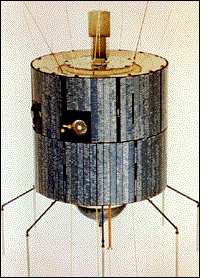Engineering:Applications Technology Satellite
From HandWiki
The Applications Technology Satellites (ATS) were a series of experimental satellites launched by NASA, under the supervision of, among others, Wernher von Braun. The program was launched in 1966 to test the feasibility of placing a satellite into geosynchronous orbit.[1] The satellites were primarily designed to act as communication satellites, but also carried equipment related to meteorology and navigation. ATS-6 was the world's first educational satellite as well as world's first experimental Direct Broadcast Satellite (DBS) as part of the Satellite Instructional Television Experiment (SITE) between NASA and ISRO.
Summary of Missions[2]
| Mission | Launch Date | Duration | Major investigations | Notable mission highlights |
|---|---|---|---|---|
| ATS-1 | December 7, 1966 | 18 years | Spin stabilization, investigated the geostationary environment, space communications | First full-Earth cloud cover images |
| ATS-2 | April 6, 1967 | 6 months | None | Launch vehicle failure caused spacecraft to reach undesirable orbit. Limited data was obtained. |
| ATS-3 | November 5, 1967 | At least 20 years | Spin stabilization, communications tests | First color images from space. ATS-3 was also used as a communications satellite, providing links to Antarctica and the Pacific Basin |
| ATS-4 | August 10, 1968 | launch failure, mission did not occur | None | Intended for geostationary orbit. Launch vehicle failure left it in a useless LEO orbit. Little data was obtained. |
| ATS-5 | August 12, 1969 | 3 year design life | Communications tests, intended (failed) testing of an ion engine | Spacecraft entered an unintended spin and encountered excessive acceleration. This caused damage to the ion engine. |
| ATS-6 | May 30, 1974 | 5 years | Tested several communications technologies, satellite assisted search and rescue, and broadcast television. | First satellite to broadcast educational content. |
See also
References
- ↑ "ATS - Applications Technology Satellites (ATS I-V)". FSU Department of Meteorology. Archived from the original on 2011-09-29. https://web.archive.org/web/20110929154555/http://www.met.fsu.edu/orgs/explores/satellites/Ats/index.html.
- ↑ "ATS (Applications Technology Satellites) Program". NASA. http://msl.jpl.nasa.gov/Programs/ats.html. Retrieved 13 April 2019.
External links
- ATS at NASA's Mission and Spacecraft Library
- ATS, Past NASA Missions
- ATS, NASA Science Missions
- ATS-E - Press Kit


